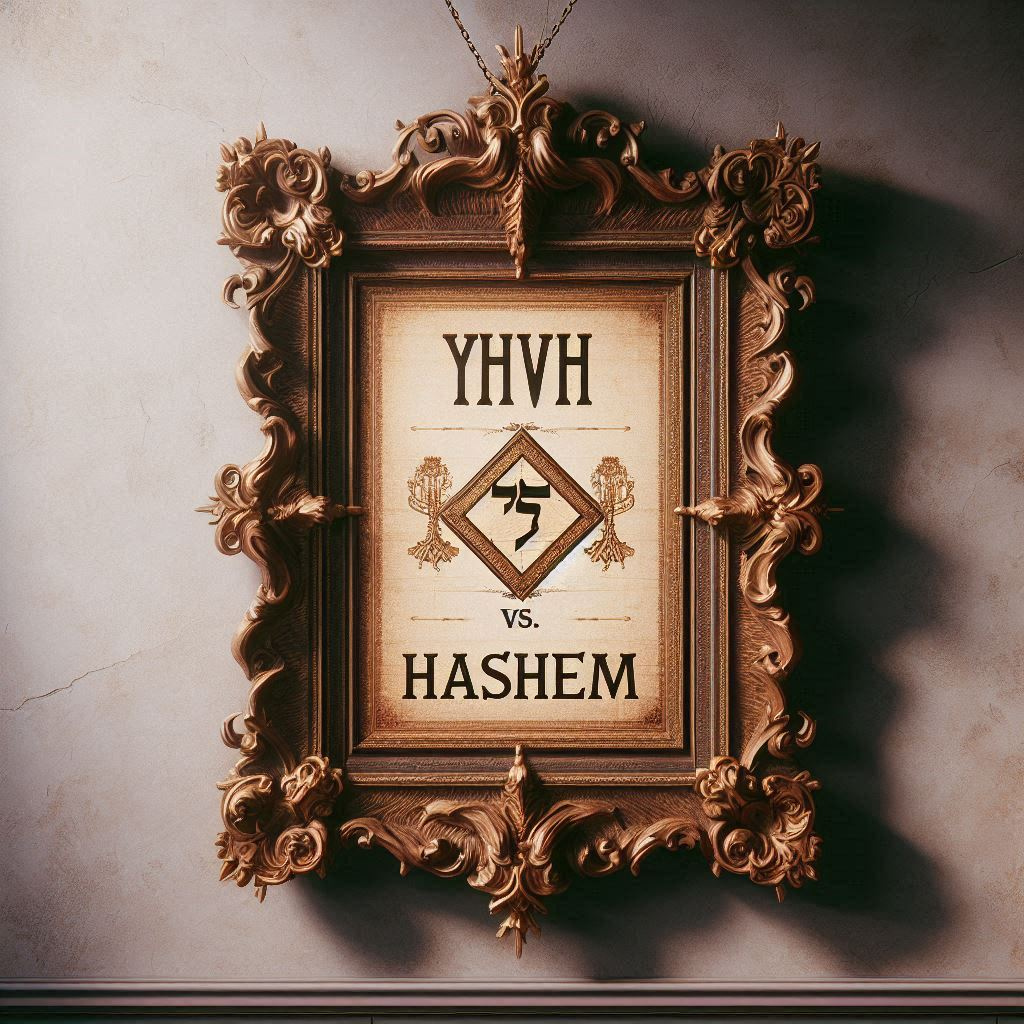The Ineffable Name Controversy: Breaking Traditions and Unveiling Truth
Introduction: In the realm of faith, the Name of Yehovah holds profound significance. However, the tradition of not uttering or writing this sacred name has sparked controversy and debate. This blog post delves into the origins, interpretations, and implications of this practice, shedding light on the true essence of the Ineffable Name.
The Tradition of Writing “G-d”: Many Jewish communities avoid writing the full name of God, opting for “G-d” instead. This practice stems from a passage in Deuteronomy, which commands the Israelites to destroy the names of non-Israelite gods. Rabbinic interpretations extended this to mean that God’s name should not be erased, leading to the tradition of writing “G-d”1.
Rabbinic Interpretations and Misinterpretations: Rabbinic authorities, such as Rashi, interpreted the prohibition against erasing God’s name as a reason to avoid writing it altogether. This led to the practice of storing or burying Jewish literature containing the name “God” once it fell into disrepair2. However, this interpretation has been contested, as the original scriptural intent was to prevent the worship of Yehovah in the manner of pagan gods3.
The True Name of Yehovah: The Father revealed His eternal and holy name to Moses, declaring it to be remembered for all generations (Exodus 3:15). Despite this, Rabbinic authorities replaced the name Yehovah with titles and descriptors like “Adonai” and “Elohim,” effectively nullifying the Torah’s instructions regarding the use of God’s name4.
The Impact of Rabbinic Regulations: By enacting regulations against using God’s name, Rabbinic authorities transgressed Yah’s eternal Torah. This has led to a widespread practice of substituting God’s name with titles, which often have pagan origins5. This practice contradicts the scriptural mandate to declare and magnify Yehovah’s name throughout the earth6.
Conclusion: As Torah-observant disciples, it is our duty to honor and proclaim the true name of Yehovah. By doing so, we fulfill the scriptural command to declare His name to all generations. Let us break free from traditions that obscure the true essence of God’s name and embrace the profound significance of Yehovah.
For those of you who would like to explore this week’s Torah Reading 13, I invite you to read and listen to the discussion entitled “Yehovah: the God Who Sees.” (Yehovah-The God Who Sees-STAR 13)
Offering Unblemished Animal Sacrifices – Idolatry and Paganism Warrants Capital Punishment – God’s Choice of King to Reign Over Us-Thoughts & Reflections on Torah Reading 139
This is the 139th Reading of our 3-year Torah Reading cycle that is found in Deuteronomy/Devarim 17:1-20. It is a continuation of Reading 138 (the previous week's reading). I've entitled this teaching: "Offering Unblemished Animal Sacrifices-Idolatry and Paganism...
The Immersion of the Two Pentecosts/Shavuots–Part 3 of our True Biblical Baptism Series
As I am recording and posting this installment of TMTO, it is Preparation Day, June 14, 2024. It is the 48th day of the counting of the omer, which means that Shavuot/Pentecost/Feast of Weeks is just two-days away, on Sunday, June 16, 2024. And yes, some members of...
Shavuot-Pentecost-Feast of Weeks — Timing is Everything
Shalom and greetings from the DFW. Trusting, hoping, and praying that this post finds you, your families, and your fellowships are well and blessed. This very short post is entitled: Shavuot-Pentecost-Feast of Weeks-Timing is Everything. As I write and record this...
Mikveh or Baptism? Which Is It? Part 2 of the True Biblical Baptism Series
This week’s teaching will take us back a year and a half ago when I started a teaching on True Biblical Baptism. That teaching was a subset, if you will, of our multi-installment Paul and Hebrew Roots teaching series I began many years ago. Unfortunately, as it...
Seven Reasons Messianics Must Stand on the Side of Israel-Part 5 of Israel’s Inextricable Link to our Salvation Series
I’ve titled this discussion: Seven Reasons This Messianic Stands with Israel. Because this discussion complements the last series, we published (i.e. Israel’s Inextricable Link to our Salvation), which is not yet finished, I included it in said series. So, this post...
Learning to Forget God — Thoughts and Reflections on Torah Reading 132
This week's discussion will be on the contents of the 132nd parashah of our 3-year Torah Reading cycle. The contents of our discussion today is found in Deuteronomy/Devarim 8.1-20. It is part of the broader annual reading cycle's "Ekev" (aka Because) that most...
Yeshua’s Passover — The Means to Our Salvation, Redemption, and Covenant Relationship with God
As I am recording and posting this installment of TMTO, many observant Jews and Messianics will celebrate Pesach tomorrow evening, April 22. We who keep the observational calendar will observe Pesach on Tuesday, April 23, as well as observing the night of our Master’s...
Choosing Yeshua as our Pesach: Shadows of Pesach 2024
I’ve chosen to title our discussion here today “Choosing Yeshua as our Pesach: Shadows of Pesach 2024.” If I could have you turn to Exodus 12.1-6, we will read the portion of Torah is directly tied to this special day on Yah’s set-apart calendar: And...
Aviv’s Prophetic Shadows of our Redemption and Salvation Through Yeshua Messiah
The Torah ... a shadow of the good matters -- good things -- to come...(The Scriptures, 3rd edition. , Heb 10:1).As I am recording and posting this installment of TMTO, we are heading into this week's Sabbath on this beautiful Preparation Day in the DFW. And yes, we...
Welcome to Aviv 2024-A Brief Overview of the Month and a Discussion of What God Expects From Us This Month
And Yahweh said to Moses and to Aaron in the land of Egypt, saying, 2 “This month will be the beginning of months; it will be for you the first of the months of the year... “Observe the month of Abib, and you shall keep the Passover to Yahweh your God, for in the...

